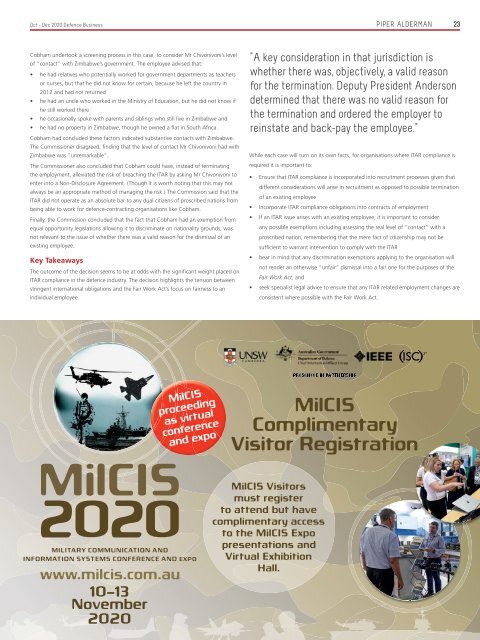Defence Business Issue 52 OCT-DEC 2020
You also want an ePaper? Increase the reach of your titles
YUMPU automatically turns print PDFs into web optimized ePapers that Google loves.
Oct - Dec <strong>2020</strong> <strong>Defence</strong> <strong>Business</strong><br />
PIPER ALDERMAN<br />
23<br />
Cobham undertook a screening process in this case, to consider Mr Chivonivoni’s level<br />
of “contact” with Zimbabwe’s government. The employee advised that:<br />
• he had relatives who potentially worked for government departments as teachers<br />
or nurses, but that he did not know for certain, because he left the country in<br />
2012 and had not returned<br />
• he had an uncle who worked in the Ministry of Education, but he did not know if<br />
he still worked there<br />
• he occasionally spoke with parents and siblings who still live in Zimbabwe and<br />
• he had no property in Zimbabwe, though he owned a flat in South Africa.<br />
Cobham had concluded these factors indicated substantive contacts with Zimbabwe.<br />
The Commissioner disagreed, finding that the level of contact Mr Chivonivoni had with<br />
Zimbabwe was “unremarkable”.<br />
The Commissioner also concluded that Cobham could have, instead of terminating<br />
the employment, alleviated the risk of breaching the ITAR by asking Mr Chivonivoni to<br />
enter into a Non-Disclosure Agreement. (Though it is worth noting that this may not<br />
always be an appropriate method of managing the risk.) The Commission said that the<br />
ITAR did not operate as an absolute bar to any dual citizens of proscribed nations from<br />
being able to work for defence-contracting organisations like Cobham.<br />
Finally, the Commission concluded that the fact that Cobham had an exemption from<br />
equal opportunity legislations allowing it to discriminate on nationality grounds, was<br />
not relevant to the issue of whether there was a valid reason for the dismissal of an<br />
existing employee.<br />
Key Takeaways<br />
The outcome of the decision seems to be at odds with the significant weight placed on<br />
ITAR compliance in the defence industry. The decision highlights the tension between<br />
stringent international obligations and the Fair Work Act’s focus on fairness to an<br />
individual employee.<br />
"A key consideration in that jurisdiction is<br />
whether there was, objectively, a valid reason<br />
for the termination. Deputy President Anderson<br />
determined that there was no valid reason for<br />
the termination and ordered the employer to<br />
reinstate and back-pay the employee."<br />
While each case will turn on its own facts, for organisations where ITAR compliance is<br />
required it is important to:<br />
• Ensure that ITAR compliance is incorporated into recruitment processes given that<br />
different considerations will arise in recruitment as opposed to possible termination<br />
of an existing employee<br />
• Incorporate ITAR compliance obligations into contracts of employment<br />
• If an ITAR issue arises with an existing employee, it is important to consider<br />
any possible exemptions including assessing the real level of “contact” with a<br />
proscribed nation, remembering that the mere fact of citizenship may not be<br />
sufficient to warrant intervention to comply with the ITAR<br />
• bear in mind that any discrimination exemptions applying to the organisation will<br />
not render an otherwise “unfair” dismissal into a fair one for the purposes of the<br />
Fair Work Act; and<br />
• seek specialist legal advice to ensure that any ITAR related employment changes are<br />
consistent where possible with the Fair Work Act.


















